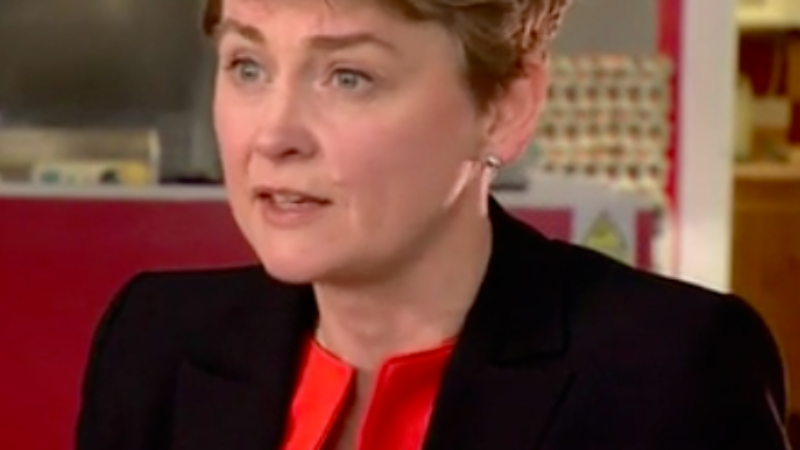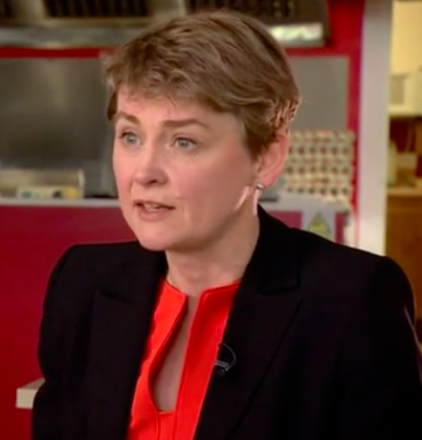
“If you don’t have a credible alternative, it’s not a real alternative at all.” It is the morning of the latest YouGov poll, which gives Jeremy Corbyn an astonishing 32-point lead. I’m sat with Yvette Cooper in a south east London Sure Start centre; it’s a fitting venue to discuss a campaign that prioritises the protection of these services. This is the first visit of Cooper’s ‘Putting People First’ tour, and while we discuss her vision and policy for the first ten minutes, it’s impossible to ignore the state of the leadership race. It is this that brings us to the ‘credibility’ question.
The credibility gap means different things for different people. No one wants to lack credibility, of course – but the argument now often seems to be framed as whether you want to feel credible or appear credible. None of the candidates would publicly accept those as the options, all attacking the “false choice” between Labour values and Labour winning, yet for anyone following this contest it is clear that it is how many are making their decision.
Cooper returns, as she often does in hustings debates and interviews, to the story of the woman she met on election day. Knocking up doors in her constituency of Normanton, this woman was brought to tears explaining how she was in arrears because she’d been hit by the Bedroom Tax. Cooper promised to help, and convinced this constituent to go and vote.
“I feel we let her down, because we lost,” she says, “And the Bedroom Tax is still in place.” It was a meeting that, looking back, she describes as “searing”.
It is that frustration at having let people down that Cooper feels is shared by those voting for Corbyn, and is driving his surge in support. His supporters, more than anything, want to send a message that they want the country to change.
“People have a sense of anger and frustration that we lost the election, and are looking around, asking: ‘How do you express that anger and frustration, and show that you want change in Britain?'”
Nothing, though, seems to work in deterring Corbyn supporters
“How do we both stay true to our values and stay strong enough to win? I don’t think Jeremy is the best way for us to win the next election, and I think if we don’t win the next election we’ll be letting people down.”
However, she is not a million miles away from Corbyn’s rhetoric in many regards: she often talks about the “assault on public services”, “the Tory myths on spending”, and stresses that the “most important thing” when cutting the deficit is “to get the economy growing strongly” and “get living standards growing”.
Before becoming an MP in 1997, had worked as a journalist covering economics. During hustings, she has occasionally clashed with Andy Burnham on the subject, adopting an arguably more ‘left wing’ position in terms of defending Labour’s pre-crash spending. It is one section on economics where I feel her views and rhetoric are not a million miles away from Corbyn:
“What I would not do, and would never sign up to, is this 40% cuts that George Osborne wants to do. I think there is an alternative to George Osborne’s austerity ideology. He is doing cuts way further than what you need to do to bring the deficit down. This is an ideological assault on public services that’s going to hit people right across the country.
“There’s a difference in philosophy here. He takes the view that public services, or tax credits – all those sorts of things – are a bad thing because they make people dependent. We know that actually they are a good thing because they make people independent.”
What is it then, that is the problem with Corbyn’s vision? The further we delve into details on policy, the wider the chasm appears. Cooper raises concerns that Labour is “going back to the remedies of the middle of the 20th century”. Nationalising companies, she argues, will not deliver “high-tech, digital jobs”. His controversial People’s Quantitative Easing (QEP) idea is “printing money”. “That’s just the same as more borrowing, pushing up interest rates,” she says, “and it’s people on the lowest income rates who’ll end up paying more as a result.”
This is what leads her to brand his campaign as “not a credible alternative”, and what became the crux of her speech this morning.
Surely then, given the polls, given the prospective scale of his victory, and given how badly many on the moderate wing of the party fear a Corbyn leadership, it is time to do something about it? I ask her if she will use all of her preferences in the race; she says she will. But should she, Burnham and Kendall send a message to their supporters to use their preferences to stop Corbyn?
“I think people should use all of their preferences. And I think the focus has to be how do we make sure we can win that election, and that’s the most important thing – and I don’t think Jeremy can do that.”




More from LabourList
Haigh: We won’t shut ticket offices or cut jobs – or nationalise water
Lou Haigh to reveal ‘roadmap’ for public ownership of railways within first term
Rochdale Labour says brick thrown at candidate’s home with ‘f*** Labour’ note